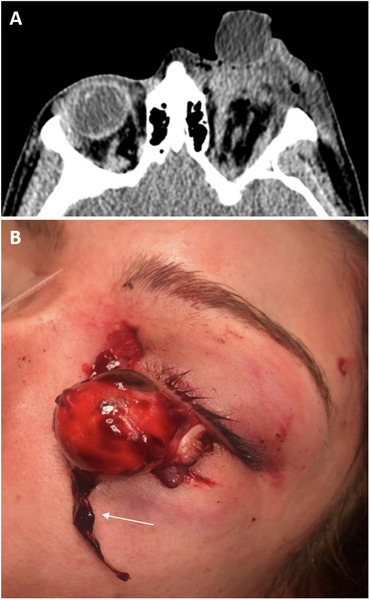1. PATIENT PRESENTATION
A 22‐year‐old unrestrained female driver presented after a head‐on motor vehicle collision with airbag deployment. She was found to have near‐complete traumatic left globe enucleation without globe rupture or other facial trauma (Figure 1A). Operative exploration revealed complete transection of the optic nerve (arrow), medial, and inferior rectus muscles (Figure 1B). The lateral and superior rectus muscle insertions were intact. She underwent surgical completion of enucleation with placement of an orbital implant to enable eventual prosthesis rehabilitation. Exploration at the scene of the accident did not reveal any potential penetrating foreign body or windshield disruption. The mechanism of the enucleation was attributed to airbag deployment.
FIGURE 1.

Near complete traumatic left globe enucleation shown on (A) computed tomography and (B) clinical images, with transection of the optic nerve (white arrow) and diffuse extraocular muscle disruption
2. DIAGNOSIS: TRAUMATIC ENUCLEATION
Since the 1998 frontal airbag mandate, eye injuries have been found after 3% of deployments, most commonly corneal abrasion, hyphema, or eyelid laceration. 1 , 2 , 3 Although extensive blunt globe rupture ultimately leading to enucleation has been reported, primary traumatic enucleation without globe injury is not yet described. 4 In the setting of severe traumatic ocular injury, emergent ophthalmic evaluation is indicated. For a non‐salvageable eye, completion of enucleation should be performed to lower infection risk and decrease the incidence of sympathetic ophthalmia, which may pose a threat to the contralateral eye. 5
CONFLICT OF INTEREST
Natalie Homer is a consultant for Pulse Biosciences, Inc.
Malhotra K, Rose J, Homer N. Devastating injury from blunt airbag trauma. JACEP Open. 2022;3:e12676. 10.1002/emp2.12676
REFERENCES
- 1. Pearlman JA, Eong KG, Kuhn F, Pieramici DJ. Airbags and eye injuries: epidemiology, spectrum of injury, and analysis of risk factors. Survey Ophthalmol. 2001;46(3):234–242. [DOI] [PubMed] [Google Scholar]
- 2. Duma SM, Jernigan MV, Stitzel JD, et al. The effect of frontal air bags on eye injury patterns in automobile crashes. Arch Ophthalmol. 2002;120(11):1517–1522. 10.1001/archopht.120.11.1517. [DOI] [PubMed] [Google Scholar]
- 3. Stein JD, Jaeger EA, Jeffers JB. Air bags and ocular injuries. Trans Am Ophthalmol Soc. 1999;97:59–86. [PMC free article] [PubMed] [Google Scholar]
- 4. O'Halloran HS, Draud K, Stevens JL. Primary enucleation as a consequence of airbag injury. J Trauma. 1998;44(6):1090. [DOI] [PubMed] [Google Scholar]
- 5. Arevalo JF, Garcia RA, HA Al‐Dhibi, Sanchez JG, Suarez‐Tata L. Update on sympathetic ophthalmia. Middle East Afr J Ophthalmol. 2012;19(1):13–21. [DOI] [PMC free article] [PubMed] [Google Scholar]


